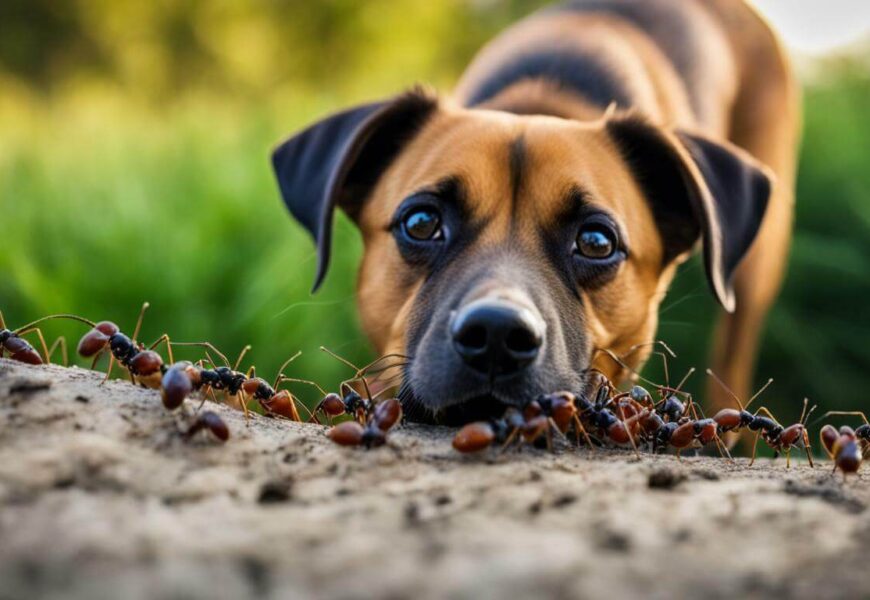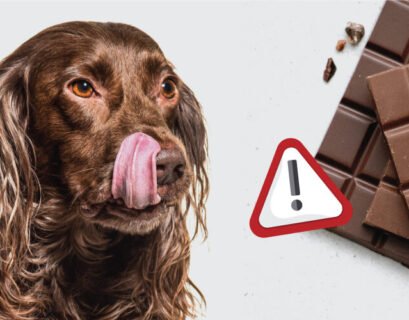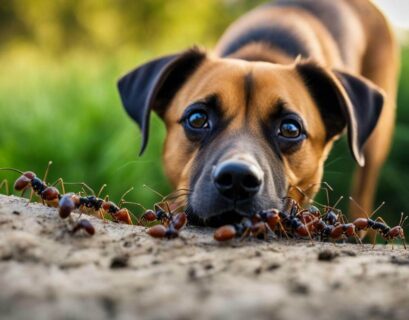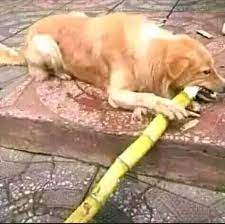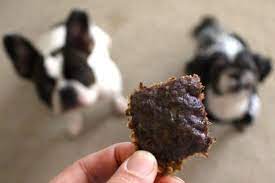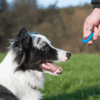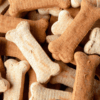As a responsible dog owner, it’s essential to prioritize your furry friend’s health and safety, especially when it comes to their diet. While dogs may have a reputation for eating just about anything, it’s important to know which foods are safe for them and which ones can be harmful. In this comprehensive guide, I will delve into the topic of canine nutrition and safety, specifically addressing the question: can dogs eat ants?
Introduction to Canine Nutrition and Safety
Proper nutrition is crucial for a dog’s overall health and well-being. Dogs require a balanced diet that provides them with the necessary nutrients, vitamins, and minerals to support their daily activities and maintain a healthy immune system. It’s important to feed your dog high-quality dog food that is specifically formulated to meet their nutritional needs.
Understanding a dog’s dietary needs is the first step in ensuring their optimal health. Dogs are omnivores, which means they can eat both meat and plant-based foods. Their diet should primarily consist of protein from animal sources, such as meat or fish, along with carbohydrates, fats, and a variety of fruits and vegetables. However, there are certain human foods that can be toxic to dogs and should be avoided.
Common Human Foods That Are Toxic to Dogs
While dogs can eat a wide range of foods, there are several common human foods that can be toxic to them. It’s important to be aware of these foods and make sure they are kept out of your dog’s reach.
Chocolate: Chocolate contains theobromine, a substance that dogs cannot metabolize effectively. Ingestion of chocolate can lead to symptoms such as increased heart rate, vomiting, diarrhea, and even seizures.
Grapes and raisins: Grapes and raisins can cause kidney failure in dogs. Even small amounts can be toxic and should be avoided.
Onions and garlic: Onions and garlic contain compounds that can damage a dog’s red blood cells and lead to anemia. It’s best to avoid feeding them any food containing these ingredients.
Avocado: Avocado contains a toxin called persin, which can be harmful to dogs. It can cause symptoms such as vomiting, diarrhea, and difficulty breathing.
Xylitol: Xylitol is an artificial sweetener found in many sugar-free products, including gum, candy, and baked goods. It can cause a rapid and severe drop in a dog’s blood sugar levels, leading to seizures and liver failure.
Can Dogs Eat Ants? Exploring the Risks and Benefits
Now, let’s address the question at hand: can dogs eat ants? While ants are not inherently poisonous to dogs, there are potential risks and dangers associated with dogs consuming ants.
Potential Dangers of Dogs Eating Ants
Ants can carry harmful bacteria and parasites that can cause gastrointestinal issues in dogs. Ingesting a large number of ants or consuming ants from an area that has been treated with pesticides can be particularly risky. Additionally, some ants can bite or sting, leading to discomfort, allergic reactions, or even anaphylaxis in dogs that are sensitive to insect bites.
Signs of Ant Poisoning in Dogs
If your dog has ingested ants or has been exposed to ant poison, it’s important to be aware of the signs of ant poisoning. Symptoms may include excessive drooling, vomiting, diarrhea, abdominal pain, lethargy, tremors, seizures, or difficulty breathing. If you notice any of these symptoms, it’s crucial to seek veterinary assistance immediately.
What to Do If Your Dog Ingests Ants
If you suspect that your dog has ingested ants, it’s important to take prompt action. First, remove your dog from the area where they were exposed to ants to prevent further ingestion. If your dog is showing signs of distress or poisoning, contact your veterinarian right away. They will be able to provide guidance based on your dog’s specific situation and may recommend bringing your dog in for a check-up.
Safe Alternatives to Ants for Dogs
While it’s generally best to prevent your dog from eating ants, there are safe alternatives that you can offer them to satisfy their natural curiosity and desire to explore. Here are a few ideas:
Commercial dog treats: There are numerous dog treats available on the market that are specifically designed to provide dogs with a safe and enjoyable chewing experience. Look for treats that are made from natural ingredients and are free from any harmful additives.
Chew toys: Providing your dog with a variety of chew toys can help redirect their attention away from ants and onto a safe and appropriate chewing option. Look for durable toys that are specifically designed for dogs and are free from small parts that could be a choking hazard.
Frozen treats: On a hot summer day, frozen treats can be a great way to keep your dog entertained and provide them with a refreshing snack. You can freeze dog-friendly ingredients, such as plain yogurt or mashed banana, in ice cube trays or special frozen treat molds.
Tips for Keeping Ants Away from Your Dog’s Food and Living Areas
Prevention is key when it comes to keeping ants away from your dog’s food and living areas. Here are some tips to help you keep ants at bay:
Store food securely: Make sure to store your dog’s food in airtight containers to prevent ants from accessing it. Avoid leaving food bowls out for extended periods and clean up any spills or crumbs immediately.
Clean regularly: Regularly clean your dog’s food and water bowls, as well as the surrounding area, to remove any food residue that may attract ants. Wipe down surfaces with a pet-safe cleaner to discourage ants from returning.
Create a barrier: Consider using ant barriers or natural deterrents, such as diatomaceous earth or vinegar, to create a physical barrier that ants cannot easily cross. Be sure to choose pet-safe options and follow the instructions carefully.
Conclusion: Prioritizing Your Dog’s Health and Safety in Their Diet
In conclusion, while dogs can technically eat ants, it is generally advisable to prevent them from doing so due to potential risks and dangers. As a responsible dog owner, it’s important to prioritize your dog’s health and safety by providing them with a balanced and nutritious diet that meets their specific needs. By understanding the potential dangers of certain human foods and taking steps to keep ants away from your dog’s food and living areas, you can ensure that your furry friend stays happy and healthy for years to come.
Remember, if you suspect that your dog has ingested ants or is showing signs of ant poisoning, always consult with your veterinarian for proper guidance and treatment. By staying vigilant and proactive, you can help protect your dog from potential health hazards and ensure their well-being.
Disclaimer: This article is for informational purposes only and should not replace professional veterinary advice. If you have any concerns about your dog’s diet or health, consult with a qualified veterinarian.
CTA: If you found this article helpful, be sure to share it with other dog owners who may benefit from this comprehensive guide to canine nutrition and safety. Together, we can keep our furry friends safe and healthy!
FAQs: Can Dogs Eat Ants? A Comprehensive Guide
Q: What if my dog ate ants?
In most cases, ingesting a few ants is unlikely to cause any harm to your dog. They might even provide a minor protein boost! However, it’s important to consider these factors:
- Type of ant: Certain species like fire ants and other stinging varieties can cause irritation and discomfort in your dog’s mouth and throat.
- Quantity: Consuming a large amount of any insect, including ants, can lead to mild gastrointestinal upset like vomiting or diarrhea.
- Underlying health: Dogs with pre-existing health issues might be more susceptible to complications.
Q: Can ants make my dog sick?
Yes, but it depends on the factors mentioned above. While generally harmless in small quantities, here are some scenarios where ants could potentially make your dog sick:
- Fire ant or stinging ant bites/stings: These can cause localized reactions, pain, and even allergic responses in some dogs.
- Large amounts of any ant: Consuming a lot of any insect can upset your dog’s stomach and lead to vomiting or diarrhea.
- Ingesting ant bait/poison: This is highly toxic and requires immediate veterinary attention.
Q: What happens if ants get on my dog?
If ants simply crawl on your dog, it’s unlikely to cause any harm. However, if they bite or sting, your dog might experience:
- Localized irritation: Redness, swelling, and itchiness.
- Discomfort: Particularly if the bite/sting is around the face or paws.
- Allergic reaction: In rare cases, some dogs might have a more severe allergic reaction to bites or stings, requiring veterinary care.
Q: Why do dogs like ants?
Dogs are naturally curious creatures, and exploring their environment often involves tasting things. Additionally, some dogs might find the movement and smell of ants stimulating and playful.
It’s important to remember that not all behavior is driven by desire to eat. If you’re concerned about your dog’s interest in ants, consult a veterinarian or animal behaviorist to rule out any underlying medical or behavioral issues.
Q: What are the signs that my dog might have a problem after eating ants?
If your dog shows any of these signs after ingesting ants, consult a veterinarian promptly:
- Vomiting
- Diarrhea
- Excessive pawing at the mouth
- Difficulty breathing
- Swelling, redness, or itching at the site of bites or stings
Q: How can I prevent my dog from eating ants?
- Implement pet-safe ant control methods in your home and yard.
- Store pet food in airtight containers.
- Supervise your dog during outdoor activities, especially in areas with high ant activity.
- Train your dog to leave unfamiliar objects, including insects, alone.
Q: When should I consult a veterinarian about my dog and ants?
- If you observe any concerning signs after your dog eats ants.
- If you suspect your dog has ingested a large number of ants.
- If your dog has any underlying health conditions.
- If you are unsure about the type of ant your dog encountered.
Related Posts
Can Dogs Eat Chocolate? A Complete Guide
Can Dogs Eat Ants? A Comprehensive Guide
March 4, 2024• Dog, Dog Food, Trending
Can dogs eat powdered donuts? Complete Guide
Can Dogs Eat Sugar Cane? The Answer May Surprise You
February 28, 2024• Dog, Dog Food
Can Dogs Eat Beef Jerky? Ultimate Guide to Feeding Beef Jerky to Your Dog
February 27, 2024• Dog, Dog Food

